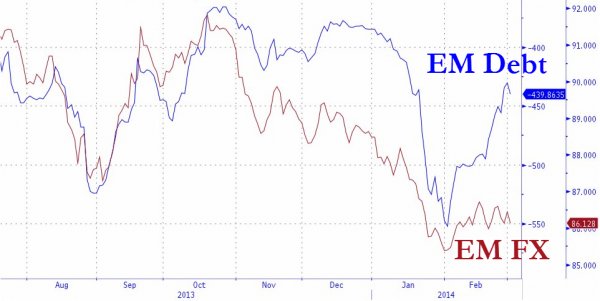While Emerging Market debt has recovered somewhat from the January turmoil, EM FX remains under significant pressure, and as Michael Pettis notes in a recent note, any rebound will face the same ugly arithmetic. Ordinary households in too many countries have seen their share of total GDP plunge. Until it rebounds, the global imbalances will only remain in place, and without a global New Deal, the only alternative to weak demand will be soaring debt. Add to this continued political uncertainty, not just in the developing world but also in peripheral Europe, and it is clear that we should expect developing country woes only to get worse over the next two to three years.
Â

Via Michael Pettis,
…
Nothing fundamental has changed. Demand is weak because the global economy suffers from excessively strong structural tendencies to force up global savings, or, which is the same thing, to force down global consumption. Lower future consumption makes investment today less profitable, so that consumption and investment, which together comprise total demand, are likely to stagnate for many more years.
Squeezing out median households
Two processes bear most of the blame for weak demand.
First, because the rich consume less of their income than do the poor, rising income inequality in countries like the US – and indeed in much of the world – automatically force up savings rates.
Second, policies that forced down the household income share of GDP, most noticeably in countries like China and Germany, had the unintended consequence of also forcing down the household consumption share of GDP. This income imbalance automatically forced up savings rates in these countries to unprecedented levels.
For many years the excess savings of the rich and of countries with income imbalances, in the form of capital exports in the latter case, funded a consumption binge among the global middle classes, especially in the US and peripheral Europe, letting us pretend that there was not a problem of excess savings. The 2007-08 crisis, however, put an end to what was anyway an unsustainable process.

